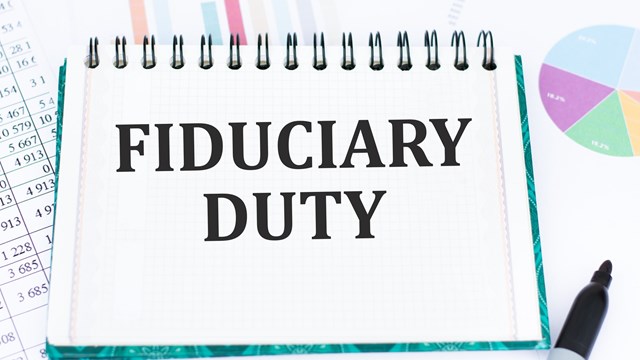
The board of a building or community association has a fiduciary duty to uphold its community’s governing documents, act in good faith, and advance the interests of the community at large. Occasionally, boards fail to carry out this duty – sometimes through mismanagement and poor decision making, and sometimes through willful disregard for the association’s bylaws. In the latter situation, there’s usually one uniting motivator: money.
When a board or manager mishandles association funds (whether they are from operating accounts or reserves), the negative ramifications can be felt across the entire community, impacting individual owners’ and shareholders’ investments. So it’s in everyone’s best interests to have competent management and legal pros helping the board guide members along the straight-and-narrow path. It’s also crucial to have a robust insurance policy in place and to identify mismanagement before it becomes debilitating.
Identify and Act
Budgeting and bookkeeping mistakes are inevitable, but diligent accounting will usually catch them before they spiral out of control. It’s the willful mismanagement and misappropriation of funds that can lead to severe problems, which need to be rooted out.
“My advice to clients faced with mismanagement or misappropriation is to gather proof – often via forensic accounting – and then, if criminal conduct appears to be involved, contact the office of the District Attorney,” says John J. LaGumina, Partner at The LaGumina Law Firm in Purchase, New York. “This usually results in swift enforcement action, including requiring the perpetrator to make restitution of the misappropriated funds. [Without] proof, it will be difficult to get the district attorney’s office interested. And a civil lawsuit would be problematic, since you’d eventually have to prove your case, and will incur legal fees while trying to do so.”
There’s also the reality that even when an individual is caught engaging in shady business, it can fall to that person’s friends and neighbors to out him or her as the perpetrator. For obvious reasons, this can be tricky. “If someone commits a crime such as theft or fraud, it should be reported and that person held accountable,” notes Robert E. Ducharme, a condominium attorney with Ducharme Law in Stratham, New Hampshire. “But unfortunately, I’ve seen multiple occasions where a board of directors has chosen not to report the matter to law enforcement or to file a civil suit, and sometimes to not even report the theft to the association’s insurance carrier – all for fear of word of mismanagement getting out and affecting resale prices.
“I believe that we have a higher duty to society in general to report these deeds,” he continues. “For instance, there’s no way of knowing whether this is repeat behavior by a guilty board member – but that’s likely to be uncovered in a civil suit or criminal case, and could save unsuspecting associations in the future from the trouble that your association may find itself in today. Put another way, an association that does not report such actions and/or sue may be an unwitting accomplice to future bad actions by the perpetrator – and if that comes out publicly, it will likely be worse than the initial outing of association mismanagement.”
Different states approach financial mismanagement in different ways, according to Mary-Joy A. Howes, a partner at law firm Goodman, Shapiro & Lombardi, which has offices in Massachusetts and Rhode Island. “Unfortunately,” she says, “we’ve had many cases dealing with board members and/or property managers stealing from clients. In Rhode Island, there’s a movement to change the statute to require that management contracts include a provision that fidelity insurance will be carried. A similar such provision is already in place in Massachusetts. It is so very important for associations to have their own adequate insurance to cover bad acts as well.”
Insure Your Future
Insurance settlements in these cases depend on who lost (or stole) the money, and how.
“Financial negligence and malfeasance are different,” explains Edward J. Mackoul, President and CEO of insurance firm Mackoul Risk Solutions in Island Park, New York. “If the board finds out that the property management firm has been stealing association funds, the board can seek to have insurance reimburse them for some or all of the amount stolen by having the management firm submit a claim under their fidelity bond policy, a.k.a., crime or employee dishonesty. Most management firms have a policy for instances like this, and associations are increasingly requiring it as part of the management contract. If management does not maintain this policy, or if the limit is inadequate to make the association whole, then the association can submit a claim to its own insurance company under the commercial property/package policy – or more likely as a separate fidelity bond policy. For the most part, every association will maintain a fidelity bond as mandated by the company holding the underlying mortgage on a co-op, or the lenders for owners in a condominium.
“Financial mismanagement is another issue,” Mackoul continues. “Typically, it’s the board who makes the decision how the association funds are handled – not the management firm, which takes direction directly from the board. If there is an instance where a management firm mishandled association money, the board could in fact sue the management. The management firm would then have to report it to their errors & omissions (E&O) carrier, which, depending on what is being alleged, would defend the management firm and provide a settlement or pay judgment if such was determined.”
The insurance limits recommended vary by association. “The ideal minimum amount is at least one-fourth of the association’s annual assessments,” suggests Howes, “plus the average balance of the reserve account – provided that the reserve account is under the custody and control of the managing agent.”
“For a fidelity bond for a community association, three months of maintenance fees is a minimum guideline, but realistically they should maintain a limit of whatever the maximum funds in their custody is,” adds Mackoul. “Naturally, the management firm would need more than this limit, since they likely manage multiple buildings and thus could see multiple claims if one individual were stealing from multiple associations. The standard E&O limit is $1 million, but a larger association could certainly require more.”
High and Dry
The worst outcome of financial misdealing at the board or management level is an association finding itself broke and without the funds to keep up with even routine maintenance. Property values can drop, and owners/shareholders who’ve done nothing wrong can find themselves at a significant monetary loss. This is why having insurance and competent, knowledgeable coverage advisors are essential.
“Of all possible remedies here, the only one that almost ever gets the association substantial returns on money lost is insurance,” says Jeffrey Diamond, an attorney with Marcus Rosenberg & Diamond in New York City. “Collecting from the perp themselves is less likely, even if they do end up going to jail, which is why insurance is so important.”
“When there is no insurance involved, an association is often left holding the bag – even if the ‘bad guy’ gets prosecuted,” adds Howes. “You can’t get blood from a stone, and many times that money is long gone. There should be checks and balances for all accounting. I always tell clients to get two signatures on checks over $1,500, and to never give up full control of the bank account to managers, as well as to always receive – and review – monthly banking statements.”
Insurance and accounting professionals advise boards to check in with their insurance carrier annually to make sure that all of the coverage and remedies mentioned above are in place. It would also be smart – even if not required by law – to request that insurance requirements are spelled out explicitly in management contracts. There’s very little downside in taking every precaution when it comes to preventing or recovering from theft or financial malfeasance.
Mike Odenthal is a staff writer/reporter for New England Condominium.









Leave a Comment